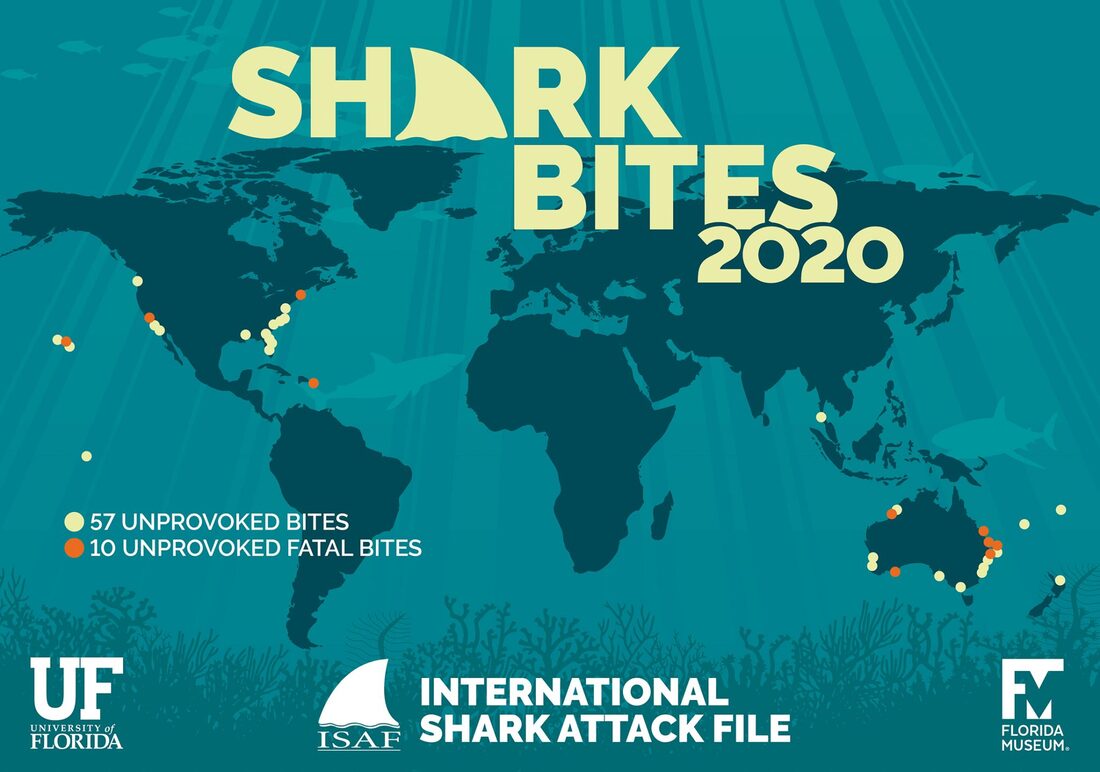|
Shark attacks decreased for the third consecutive year, falling to 57 unprovoked bites worldwide in 2020, compared with 64 bites in 2019 and 66 in 2018, according to the annual summary issued by the University of Florida’s International Shark Attack File. The most recent five-year global average sank to 80 incidents annually. But it was the deadliest year since 2013, with 10 unprovoked bites resulting in fatalities, a stark departure from the average of four per year. Six of the fatal bites occurred in Australia, three in the U.S. and one in the waters of St. Martin in the Caribbean. Consistent with long-term trends, the United States led the world in the number of bites, with 33 incidents, a 19.5% drop from 41 last year. Australia followed with 18, a slight uptick from the country’s most recent five-year average of 16 bites per year. Gavin Naylor, director of the Florida Museum of Natural History’s shark research program, said the high number of deaths in 2020 is likely an anomaly. “It’s a dramatic spike, but it’s not yet cause for alarm,” he said. “We expect some year-to-year variability in bite numbers and fatalities. One year does not make a trend. 2020′s total bite count is extremely low, and long-term data show the number of fatal bites is decreasing over time.” Experts also confirmed single, non-fatal bites in the Republic of Fiji, French Polynesia, New Caledonia, New Zealand and Thailand. ISAF investigates all human-shark interactions but focuses its report on unprovoked attacks, which are initiated by a shark in its natural habitat with no human provocation. These exclude bites to boats, scavenging and bites in public aquariums. The past three years have marked an abrupt drop in global shark attacks from previous totals in the high 80s. 2017′s 88 unprovoked bites, for example, were average at the time. Still, 2020′s total of 57 bites worldwide represents a larger-than-expected decrease from 2019 and 2018, Naylor said. It remains unclear whether COVID-19 lockdowns and a slow year for tourism might have contributed to an unusually low number of bites – or if the dip reflects the challenges of getting data during a pandemic. While a certain number of cases remain unconfirmed and unclassified each year, this situation was exacerbated in 2020, said Tyler Bowling, ISAF manager. With law enforcement, coroners and healthcare workers focused on responding to COVID-19, few had time to help confirm reported shark bites or provide extra information about incidents. As a result, Bowling is still working to confirm 16 reported bites and classify an additional six confirmed bites as unprovoked or provoked. In contrast, nine incidents were unconfirmed in 2019 and nine were confirmed as shark bites but could not be classified. All open cases remain under investigation, Bowling said. Surfers and other board sport athletes, largely undeterred by the pandemic, experienced 61% of bites worldwide in 2020, compared with 53% in 2019 and 2018. With 1,350 miles of coastline and a large surfing community, Florida has long been a global hotspot for shark bites, a trend that continued in 2020. The state’s 16 unprovoked bites accounted for about 48% of the U.S. total and 28% of incidents worldwide, though the total was significantly lower than Florida’s five-year annual average of 30.
Eight of the bites happened in Volusia County, followed by three in Brevard and single attacks in Duval, Martin, Miami-Dade, Palm Beach and St. Johns counties. Other states with unprovoked bites include Hawaii, 5, California, 4, and North Carolina, 3, with single incidents in Alabama, Delaware, Maine, Oregon and South Carolina. Three of the bites proved fatal, one each in California, Hawaii and Maine, a first for the state.
0 Comments
Leave a Reply. |
blogArchives
May 2025
Categories
All
|
Funding from this plate will be directed to programs that promote coastal access, make coastal lands welcoming to all, and increase opportunities for coastal enjoyment.





